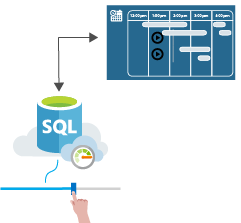Azure Database Options
 The latest build of JAMS V7 provides users with a new database option – Azure SQL. For most enterprises, SQL, or even SQL Express, has plenty of horsepower to handle data on the back end of JAMS. We specifically designed JAMS to consume as few resources as possible – an efficient database structure, small payloads, and tight queries. Smart workload automation, however, tends to spur growth. So, while you may have been running hundreds of jobs when you started, you may be running thousands today.
The latest build of JAMS V7 provides users with a new database option – Azure SQL. For most enterprises, SQL, or even SQL Express, has plenty of horsepower to handle data on the back end of JAMS. We specifically designed JAMS to consume as few resources as possible – an efficient database structure, small payloads, and tight queries. Smart workload automation, however, tends to spur growth. So, while you may have been running hundreds of jobs when you started, you may be running thousands today.
Whether for scaling, cost, or company policy, you may need to consider a new backend database. Why are enterprises looking to Azure SQL? Here are some of the reasons you might consider switching to Azure SQL.
- Security Policy
Even though you are the champion of automation, someone else manages database security, and that person has decided that Azure SQL makes it easier to administer privileges, define roles, and execute retention policies. - Cost Control
Your DBA decided your enterprise could save millions by letting go of some of those SQL site licenses. Azure SQL helps you scale with the needs of the business. - Regulation
Regulatory requirements can add considerable bloat to an automation solution. Some require exhaustively detailed audit data; others require you to retain jobs history and logs for a much longer period. If sheer transaction volume is pushing your on-premise database to its limits, a DBaaS can offer considerable capacity at a lower cost than a site license.
Regardless of the reasons why you may need to use it, JAMS gives you the ability to choose Azure SQL – during installation, or at a later date.
Deploying the JAMS database to Azure SQL is easy. If you are already using JAMS for workload automation, and would like to migrate an existing database to Azure SQL (or RDS – we support that too), just follow these steps for moving the JAMS database.